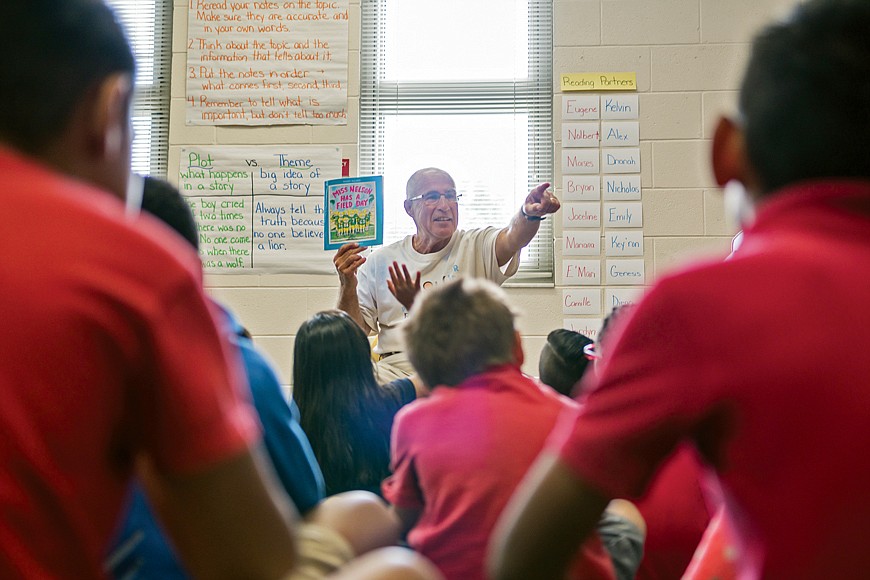- November 24, 2024
-
-
Loading

Loading

Vince Cera grew up in Detroit, the son of an American father who met his “war bride” in Italy during WWII. Around the house, his mother spoke mostly in her native Italian mixed in with broken English.
“It was not a household with a lot of books,” Cera recalls. “I always struggled with reading comprehension. I got good grades, but I had to work two, three times harder because those (reading) skills were not developed at an early age for me.”
These childhood challenges spurred Cera, who’s been retired for nine years, to set aside at least one day a month to read to second-graders at James Tillman Elementary School in Palmetto. A Lakewood Ranch resident, he volunteers as a reader for the Rotary Club of Lakewood Ranch’s primary community outreach project, Books For Kids.
Buoyed by more than 70 volunteers, the program predominately caters to area elementary schools serving communities with a high percentage of economically disadvantaged students. Many of these students are saddled with reading disabilities and live in homes bereft of books.
Ted Lindenberg , the program’s director and founder, is a lifelong educator who splits time between homes in Lakewood Ranch and suburban New York City. This Brooklyn-raised firebrand is a committed evangelist for literacy, having spent four decades as a teacher and administrator.
When he arrived in Manatee County about seven years ago, he became a board member of the Literacy Council of Sarasota and joined the Rotary Club of Lakewood Ranch. “The Literary Council works with adults who cannot read,” he says, “but after a while, I realized it was more important to me to reach out to children, because maybe we can limit the number of adults who are functionally illiterate in later generations.”
Books for Kids hatched out of the Rotary Club’s literacy group, for which Lindenberg served as chairperson. Four years ago, the organization used to simply distribute books to schools, until it dawned on members that literacy is about more than just access to books. “We needed to help kids read more effectively,” Lindenberg says. “That’s when we developed Books for Kids.”
The program does more than just place adult readers in a classroom for an hour. It offers professional training for volunteers, so they can better engage students in discussions that emphasize reading comprehension and critical thinking. Although it serves only second- and third-graders, Lindenberg plans to add first-graders to the roster next year.
Here’s how Cera describes the experience: “I work with a wonderful teacher. Her name is Nicole Smith. She makes sure the kids are well behaved, and introduces me as ‘Mr. Vince.’ We sit in a circle and we’ll have an icebreaker conversation — like, ‘How was your weekend?’ I introduce the book and start the reading session. I’ll intermittently stop and ask some questions about the book: What they liked, what they disliked, what it meant to them. If anything, I have to slow them down because they’re so full of questions.”
The best part of Cera’s visit comes at the end — the capper — when he reaches into his bag and hands every kid a new book. The titles are based on the teachers’ assessment of each student’s individual reading level.
“When I look at the classroom, you can tell they are not exposed to a lot of books in the home,” Cera says. “About half are Hispanic kids who come from homes where English is not the primary language.”
Even though he earned an MBA and enjoyed a long career as the general operations manager for Federal Home Loan Bank of Indianapolis, he remembers what it was like to read and re-read difficult sentences; how long it took him to get through a book.
Books for Kids has given away more than 20,000 books to boys and girls in Sarasota and Manatee counties —
averaging 1,500 books a month. Maintaining that inventory is not easy. The program’s books are purchased, not donated, which means Lindenberg and his group of administrators must raise roughly $30,000 a year to sustain that pace. Unlike most nonprofits, no one, not even Lindenberg, receives a paycheck to keep the club’s project afloat.
Everyone is in it for the kids. And the stories.
“When I give the books to the kids at the end of the session, I encourage them to take it home and read it, share it with others,” Cera says. “This one kid, he lives in a mostly Spanish-speaking home, said he took the book home and read it to his mom and dad and the other kids in the family. I said, ‘That’s really nice.’ The young man went on to say, ‘They told me how proud they were of me, how much they loved me for taking reading so seriously.’ Honestly, it shocked me, he was so proud.”